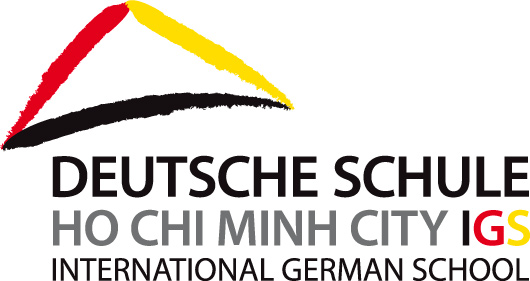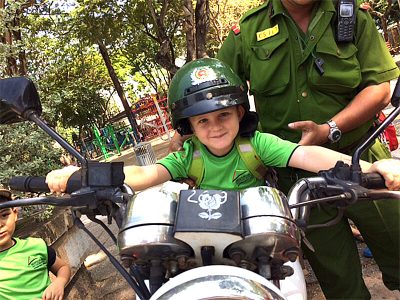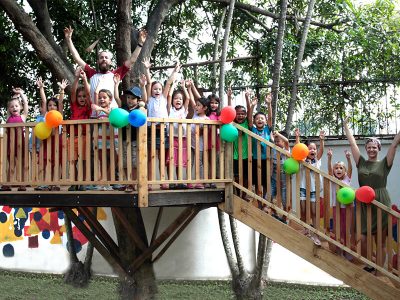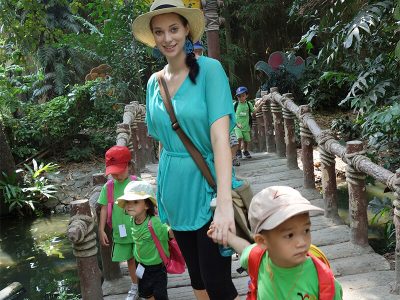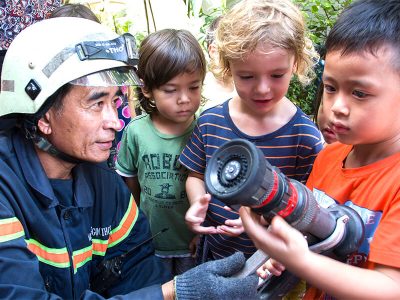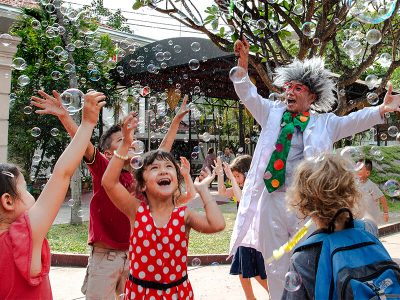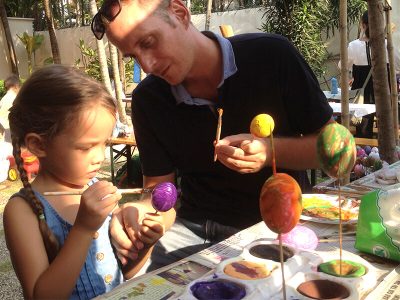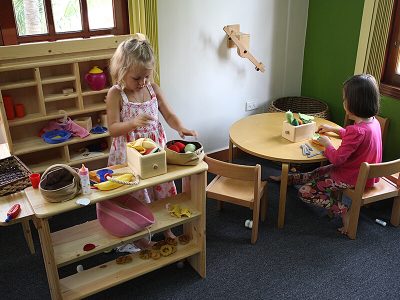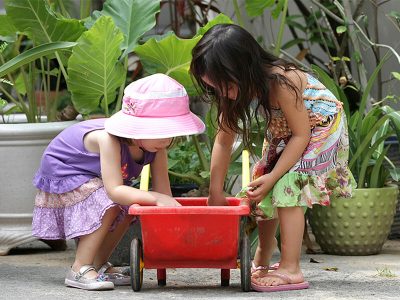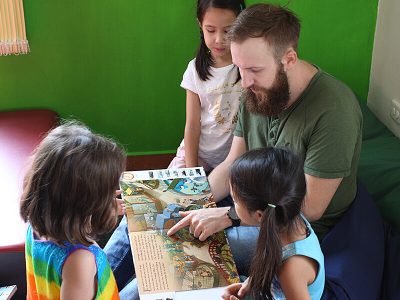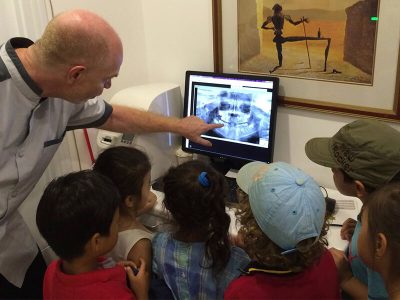U6 Section
Dear parents
Children from 17 nations aged 2 – 6 years are currently attending our U6 Section. In addition to German and English, the under 6 year olds acquire all the necessary skills for starting school.
The basis for our work in the U6 Section are the Qualitätsrahmen für Kindergarten und Vorschule an Deutschen Schulen im Ausland (Quality framework for kindergarten and pre-school at German schools abroad) as well as an internal curriculum with an intensive language acquisition programme.
Both supervision and implementation of the learning units in the U6 Section are carried out by fully qualified German-speaking educators.
WHAT ARE THE MAIN FOCAL POINTS OF THE U6 Section?

CREATIVITY IS THE CURRENCY OF THE FUTURE
We want children to experiment with colour instead of just painting shapes. They should rhyme, develop melodies and invent rhythms themselves. We also attach great importance to reading aloud, and children themselves are encouraged to develop ideas about characters involved.

MULTILINGUALISM
The U6 Section is also bilingual. The main language is German however some modules are taught in English. Our language development program supports the development of thinking skills and the ability to reflect on the world around us.

EARLY SCIENCE EDUCATION
Contemplating nature sensitivities to the environment and train observation skills. Children recognise the connections between location, construction, and function and learn to think in cause-and-effect contexts. They see and understand themselves as part of the environment, learn to perceive the beauty of nature, and develop responsibility for the conservation of nature.
HOW IS THE U6 SECTION STRUCTURED?
| Nursery | Kindergarten | Preschool | |
|---|---|---|---|
| Number of groups | 1 | 1 | 1 |
| Average size of groups | 12 | 14 | 14 |
| Number of educators | 2 | 1 | 1 |
If necessary, the above mentioned differentiation into different age groups will be adjusted by larger groups of mixed age.
The opening hours are Mondays – Thursdays from 7:45 to 16:15, Fridays from 7:45 to 14:30.
School breaks are based on school holidays. During the holidays, some shortened and “care days” (9:00 to 14:30) are offered at an extra fee.
WHAT ARE OUR EDUCATIONAL BELIEFS AND PRINCIPLES?
Competence, values, intelligence and personality, cannot be made “from the outside”. Instead, they are constructed by the child themselves. We therefore believe it is vitally important for the children to play an active role in shaping their learning environment and to take responsibility for themselves and surroundings from an early age.
It’s our job to provide a stimulating learning environment and an authentic experience of reality in “safe place”. We want the children to examine, try out, and experiment independently and at their own learning pace.
When children play freely, precious natural learning situations arise. In addition to these natural learning opportunities, we ensure other knowledge based on a curriculum which includes seasonal topics, the celebration of German and Vietnamese festivals, observation of nature, logical-mathematical support, music, arts, and sports.
Children are encouraged to experience life using all their senses. This includes the awareness of their environment as well as their own body, through such feelings of joy, happiness sadness, etc.
Experiences in natural or constructed spaces determine the development of coordination, perception, and thought processes. Go-karts, climbing frames and “mountains”, slides, swings, and sandboxes aid in developing gross motor skills. There are also learning, action, and relaxation areas in the individual group rooms for: free play, building, painting, experimenting, gymnastics, making music, dressing up, as well as reading and puzzle corners, areas for recreating experiences with shops, kitchens, doctors’ rooms, or doll corners.
In addition, there are areas for learning sequences which take place under the direct supervision of the educators, such as morning circle, language training, early science training, sports, swimming, or music.
An abundant learning environment allows children to discover and train themselves. We regard this as an important prerequisite for making conscious decisions and taking responsibility for oneself and others.
WHAT DOES A TYPICAL DAY WITH US LOOK LIKE?
| Time | Activity |
|---|---|
| 07:45 – 09:30 | Flexible arrival time Free play in the garden, open breakfast, swimming (once a week) |
| 09:30 – 09:50 | Morning circle about current topic, Language promotion, early mathematical education |
| 09:50 – 10:50 | Creative activities, individual support, free play |
| 10:50 – 11:20 | Language promotion German/English Early science education |
| 11:20 – 12:00 | Lunch |
| 12:00 – 13:30 | Perusing picture books, rest time as needed |
| 13:30 – 14:30 | Nap time / free play, as needed |
| 14:30 – 14:45 | Individual support/free play |
| 14:45 – 15:15 | Snack |
| 15:15 – 15:45 | Sports / Music / rhythmic movement / English |
| 15:45 – 16:00 | End of day circle, reflecting on the day |
| 16:00 – 16:15 | Free play in the garden / pick-up time* |
The pick-up time in the U6 area is Monday to Thursday between 4:00 p.m. and 4:15 p.m. and Friday between 2:15 p.m. and 2:30 p.m. In the case of late pick-up, an additional care fee for the extended care time for each quarter of an hour will be charged.
HOW DO WE MEASURE THE SUCCESS OF OUR PEDAGOGICAL WORK?
Children feel safe, secure and supported, as well as belonging to a community. They have an understanding of the rights and obligations which enable active participation. Increasingly, they take responsibility for their own health and physical well-being.
They are able to perceive and react to complex situations, they are enthusiastic and enjoy learning. They develop curiosity, commitment, creativity and imagination, endurance, resilience, concentration and a willingness to cooperate. They are able to assess strengths and limits and adapt their learning behaviour accordingly. They are willing to take risks and are open-minded when it comes to venturing into new areas for development.
The students question and reflect critically, explore, experiment and can think analytically, formulate hypotheses, grasp complex problems and solve them with consideration to ethical aspects.
They possess specific knowledge and the ability to view and evaluate phenomena from different perspectives. They use people, technology, artificial and natural media as sources of information and are able to understand symbols, patterns and work systems, as well as integrating what they have learned into their own behaviour.
They can clearly themselves verbally and non-verbally, and defend their convictions based on principles of logic.
Children are responsible for the environment and actively work towards a harmonious coexistence. They value cultural diversity and their own cultural identity(ies). They understand and value elements of their own culture and personal history; they are open to the view points, values, and traditions of other people and communities.
They have developed principles for their actions. Values such as justice, honesty, respect, mindfulness, dignity and the needs of others have been internalized.
WHAT STARTING AGE IS APPLICABLE TO U6 Section?
| Kindergarten | Preschool | |||
|---|---|---|---|---|
| Age in years | 2 – 4 | 5 – School entry | ||
| Entry | Year-round | |||
| Time of transition to level | possible during the year | with the school year change | ||
| Deadline | August 15th | |||
INTERESTING FACTS ABOUT YOUR CHILD AT IGS
What are the requirements for admission?
Age-typical development of mother-tongue, social, mental, affective and motor skills, if necessary the diagnosis of special training needs.
Knowledge of the German language is not a prerequisite.
Trial period
Before admission to the U6-section, there is a mandatory probationary period during which you will be given the opportunity to learn more about our various processes. The trial period is agreed upon with the parents individually and lasts between 2 to 5 days. After successful completion of the course, you will receive confirmation about admission from the school office.
A gentle familiarisation for your child
“We’ll make sure that your child feels comfortable from the beginning and that s/he can easily find her/his way around in the new environment.”
Entry into to the U6 Section, the change of a facility or the transition between the groups or the school are usually associated with a change of environment and the familiar caregivers.
Adapting to the new environment requires special learning outcomes, for example with regard to new spacial and social conditions. Often, learning potential and the willingness to deal with new learning content only arise when a feeling of safety and security has been established.
For this reason, there is a soft familiarisation phase in the U6 Section: Your child first attends IGS with you for a couple of hours, then attendance hours without you are gradually increased from a few hours to whole days.
How does the change from Kindergarten to Preschool happen?
The starting point for the recommendation is the child’s level of development and the aim of optimal promotion of abilities. The change into the age-specific Pre-School program usually takes place at the end of the school year. August 15th is regarded as the cut-off date.
Readiness for school is the prerequisite for enrollment at school
The Readiness for school is determined on the basis of the results of an extended observation period in preschool and attested by the primary school as part of a school entrance test.
In close cooperation with the teachers of the primary school, the preschool prepares children for their first day at school.
HOW CAN YOU FIND OUT ABOUT YOUR CHILD’S DEVELOPMENTAL STEPS?
Dojo & Portfolio
Several times a week, Dojo gives you an insight into your child’s everyday learning. You are, so to speak, there when your child is doing handicrafts or painting, looking at a book or building a large cave to hide.
Important works and milestones of your child’s development are collected in a portfolio folder. You will receive the complete portfolio at the end of each Kindergarten year.
Parents’ Coffee and Parents’ Meetings
At parents’ meetings or at the parents’ coffee, educators inform parents about developmental steps and news from the individual groups.
Development talks
On the basis of a standardised competence chart, you will receive a verbal assessment of your child’s development progress twice a year. The competence chart provides suggestions for discussions about observations made in the group or at home.
In addition to the above-mentioned options, you can of course contact us by e-mail and / or phone or arrange a personal appointment.
We would be happy to answer any questions you may have about the U6 Section or give you a personal guided tour of our green campus. Please contact julia.nguyen@igs-hcmc.org or call our school office + 84 (0) 28 37 446 344 for more information.
Registration
Are you convinced that IGS is the right school for your child?
Send us your registration conveniently online. We look forward to hearing from you.
